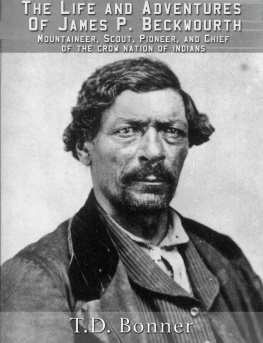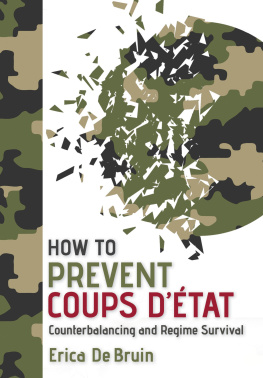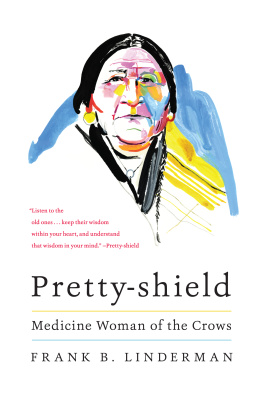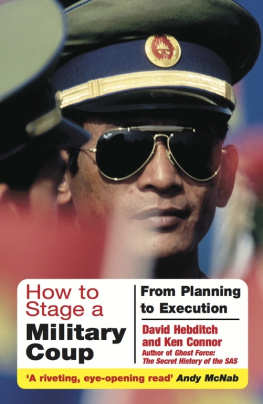
This edition is published by BORODINO BOOKS www.pp-publishing.com
To join our mailing list for new titles or for issues with our books borodinobooks@gmail.com
Or on Facebook
Text originally published in 1930 under the same title.
Borodino Books 2017, all rights reserved. No part of this publication may be reproduced, stored in a retrieval system or transmitted by any means, electrical, mechanical or otherwise without the written permission of the copyright holder.
Publishers Note
Although in most cases we have retained the Authors original spelling and grammar to authentically reproduce the work of the Author and the original intent of such material, some additional notes and clarifications have been added for the modern readers benefit.
We have also made every effort to include all maps and illustrations of the original edition the limitations of formatting do not allow of including larger maps, we will upload as many of these maps as possible.
PLENTY-COUPS, CHIEF OF THE CROWS:
THE LIFE STORY OF A GREAT INDIAN
by
FRANK B. LINDERMAN
Illustrated by H. M. Stoops
DEDICATION
To My Grandson
JAMES BEALE WALLER
FOREWORD
PLENTY-COUPS (Aleek-chea-ahoosh, meaning Many Achievements) had been Chief of the Crows (Absarokees) ever since knew anything about them. He was probably the last legitimate chieftain who had seen much of the old life of the plains Indian, and I have written his story as he told it to me so that a genuine record of his life might be preserved.
I am convinced that no white man has ever thoroughly known the Indian, and such a work as this must suffer because of the widely different views of life held by the two races, red and white. I have studied the Indian for more than forty years, not coldly, but with sympathy; yet even now I do not feel that I know much about him. He has told me many times that I do know himthat I have felt his heart, but whether this is so I am not certain. And yet a stranger, after spending a weeks vacation in our national parks, alternately fishing and talking to an English-speaking tribesman, will go home and glibly write all there is to learn about the habits, beliefs, and traditions of the Indian tribes of the North-west.
Napoleon said after reading The Iliad: I am specially struck by the rude manners of the heroes, as compared with their lofty thoughts. The Indian has startled us by the same contrast, and so confounds us in our final estimate of the race we have conqueredfrom whom we might have learned needed lessons, if we had tried.
Now is too late. The real Indians are gone, and in the writings which will come from their descendants, we shall find difficulty in deciding between truth and falsehood concerning a life the writers could not have known. The change from a normal to an uncertain and unnatural existence came so suddenly to the plains Indian that his customs and traditions could not flourish, and they all but perished with the buffalo in the early eighties. One is startled that so brief a time could wipe away traditions ages old, and after contemplation wonders how much truth we know of ancient peoples.
The Crows as a tribe have always been friendly to white men, there being but a single instance of their tribal hostility. This was their farcical attempt in 1834 to starve out the traders at a post of the American Fur Company on the upper Missouri River, because the Company had located it in the territory of their bitter enemies, the Blackfeet. They fired no hostile shot, however, and made no attack on the fort, except to surround it quietly and pitch their lodges, which ten days later were dispersed by a single cannonball landed in their midst.
The Crows appear to me to be different from their neighbors in many respects [for one thing, they would not trade their furs for whisky], and I believe that at some time they came out of the South. They were almost constantly at war (mostly defensive) with the Sioux, Cheyenne, Arapahoe, and Blackfeet. This alone proves they were good fighting men, since, outnumbered as they were by such enemies, they could not otherwise have escaped annihilation.
But as I have said, the white man found them friendly, and soon began to use them against the tribes who disputed his way across Montana and into the Black Hills of South Dakota. He even gave them arms and ammunition, and besought the Government of the United States to do likewise. Chief Plenty-coups had in his possession a letter written by former Governor Potts of Montana territory beseeching the Government of the United States to arm the Crows, and saying in effect that the Crows when under arms were worth more to white settlers in the Northwest than all the army posts ever established.
F. B. L.
I
PLENTY-COUPS, aided by Coyote-runs and Braided-scalp-lock, seated himself in round his cabin on Arrow Creek. I am glad you have come, Sign-talker, he said, his nearly sightless eyes turned upon me. Many men, both of my people and yours, have asked me to tell you the story of my life. This I have promised to do, and have sent for you; but why do you wish to write down my words, Sign-talker?
The least suspicion that his story might count against him or his people would result in my failure to get a truthful tale of early Indian life on the plains. My answer must be honestly and carefully made.
Because I do not believe there is any written story of an Indian chiefs life, I said. If you tell me what I wish to know, and I write it down, my people will better understand your people. The stories which I have written of Esacawata and the Crows have helped white children to know the children of your tribe. A better understanding between your people and mine will be good for both. Your story will help the men of my race to understand the men of your race.
Magpies jabbered above the racks of red meat hung to cure in the dry air, and the Chiefs dogs, jealous and noisy, raced below them. By gift, the dogs would get very little of the meat they guarded; the magpies, more by theft.
You are my friend, Sign-talker. I know your heart is good. I will tell you what you wish to know, and you may write it down, said Plenty-coups, at last. I would have Coyote-runs and Plain-bull sit with us each day, he added. I am an old man, and they will help me to remember.
Good! I agreed, glad of their company. They had known Plenty-coups all their lives and were different as two men could be. Plain-bull, thin and spare, was retiring; his badly scarred forehead was a reminder of strenuous life. Coyote-runs was tall and sturdy, his voice deep, and his manner aggressive. Both were old men, and both expressed satisfaction at the Chiefs decision to tell me his story.
If you do not tell allif you forgetI will touch your moccasin with mine, Coyote-runs warned the old Chief, seriously. We trust Sign-talker, he said. Begin at the beginning. You are sunk in this ground here up to your armpits. You were told in your dream that you would have no children of your own blood, but that the Crows, all, would be your children. Your medicine-dream pointed the way of your life, and you have followed it. Begin at the beginning.













